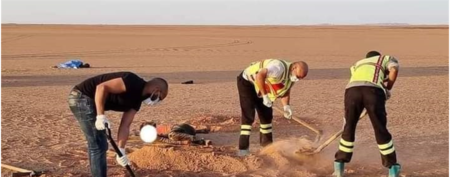R.I.P.
According to the report, the people were refugees from Sudan who were on their way to try to reach Europe. The report further states that they had been abandoned and left behind in the desert by their smugglers.

This sad news about the death of four migrants in the Libyan desert, besides many more who already died in the desert and have never been found, tragically highlights several crucial points:
Sudanese refugees caught in a limbo between Niger and Libya
For years, people have fled war torn areas in Sudan for other countries in the region. In Libya, many of them have become victims of cruel atrocities commited by militia groups and criminal gangs. In Niger, a considerable number of Sudanese refugees have been living in refugee camps run by the UNHCR and affiliated organisations for the last couple of years, hoping for a positive outcome of their asylum applications and for a chance to get a resettlement towards another country where they could find a safe place to stay in humane conditions. For most of them, none of these hopes has been satisfied so far. Dissatisfaction over the denial of resettlement, over the fruitless wait for an asylum decision and over the poor living conditions in UNHCR camps have led to several waves of protests by Sudanese refugees in Agadez and Niamey in recent years. The authorities of Niger and the UNHCR have mostly responded by repression, but not provided any solution. Some of the Sudanese refugees see no more other option to escape this hopeless situation than to make the perilous journey through the desert and across the Mediterranean Sea.
Repressive migration control increases risk of death
It has to be pointed out that the policies of repressive migration control that have been established throughout the Sahel and Sahara countries under the influence and funding by EU states has not reduced but increased the risks of death on the flight and migration routes. The presence of patrols and control posts on the desert routes pushes drivers to resort to the most remote and dangerous routes and also increases the risk that some drivers may flee to avoid being caught and leave passengers behind in the desert.
People die where safe passages are denied
It must not be forgotten that none of the refugees and migrants would have to die in the desert and in the sea if they had freedom of movement and access to safe passages. Without visa restrictions and with access to airline tickets, it is rather simple to travel from one African country to another - or between Africa and Europe. In contrast, it is now virtually hopeless for most citizens of African countries to apply for a visa at a European embassy, and access to the embassies alone is like an obstacle course.
Importance of solidary structures to save lives
As long as thousands of people are forced to risk their lives on the flight and migration routes, there is a need for practical initiatives against letting people die in the desert. Alarme Phone Sahara and other solidary structures share practical information about the risks of the desert, respond to emergency calls, organise rescue patrols or try to alert local authorities if there are any news about people in distress. For this, the contact of structures like Alarme Phone Sahara has to be shared widely and support is needed to build up more resources for practical rescue.
Alarme Phone Sahara demands:
- Evacuation of migrants and refugees from Libya!
- Refugees who are blocked in UNHCR camps in Niger must get a resettlement to a safe place where they can stay in humane conditions!
- Practical initiatives to save the lives of migrants and refugees on their way through the desert - no more repressive migration policies that put peoples' lives in danger!
- Freedom of movement and safe passage for all!
May the four Sudanese persons who dies in the Libyan desert and all those who dies or were killed in the desert and in the sea rest in perfect peace!

